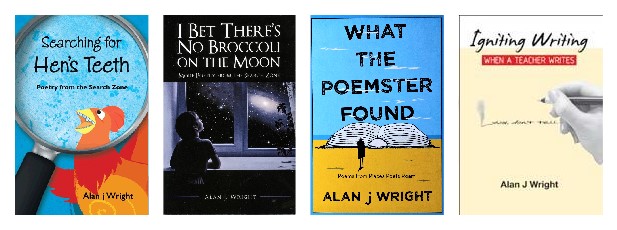 |
| The Poet's Suitcase Revealed! |
- Collect poetry that reflects the cultural group you are studying –poetry by and about.
- Collect pictures of areas your class is studying. Have students write a poem that matches a picture.
- Do a shared writing session with your students where you a poem together about the heritage or customs of the people or region you are studying.
- Ask students to organize a collection of poems relating to their own culture. You could organize them around such categories as celebrations, families, food, holidays.
- Collect photo essays, newspaper and magazine articles, informational books, and historical fiction for students to use as source material for poetry
- Have students dramatize poems by sharing lines or stanzas. Suggest that they vary solo voices with group voices to enhance meaning.
- Make weather poems using weather reports as the basis for ideas.
- Explore landforms through poetry by asking students to find poems about rivers, mountains, lakes, prairies, deserts or rain forests.
- Write a paragraph about a famous person from history or some prominent present day individual. After they have written the paragraph help them to pare it down into a poem.
- Encourage students to tell their own stories in poetic form
- Use a science activity to launch a poetry writing activity. A poem about volcanoes for instance. Mix poems with informational writing and pictures.
- Encourage students to write poems that express a particular point of view.
- Have students work in pairs to turn prose into poetry
- Have students compose a poem to go with a report on a particular social issue. This will help to better understand how poetry can convey strong emotions.
- Have students write poems using two voices that convey different sides of an argument or issue.
- Use newspapers to get students to write ‘found poems’ In this activity they look for a particularly engaging slice of language to enlarge into a poem, or they might look for an item or story that can be pared down into a poem.
- Have students look for examples of alliteration, metaphor, or simile in anthologies and record them on a chart.
- Deconstruct a short poem and have students reconstruct it.
Resources for Poetry Ideas:
Three Voices –An Invitation to Poetry
Across the Curriculum, Bernice Cullinan, Marilyn Scala and Virginia Schroder,
Stenhouse 1995
The Story In History –Writing your Way into
the American Experience, Margot Fortunato Galt Teachers and Writers
Collaborative 1992
Poetry Everywhere, Jack Collom and Sheryl
Noethe, Teachers and Writers Collaborative 2000

Comments
Post a Comment